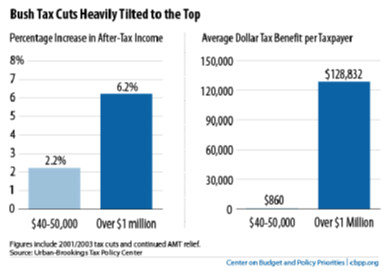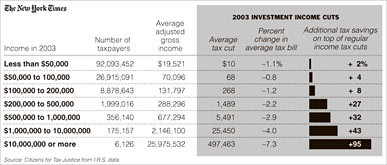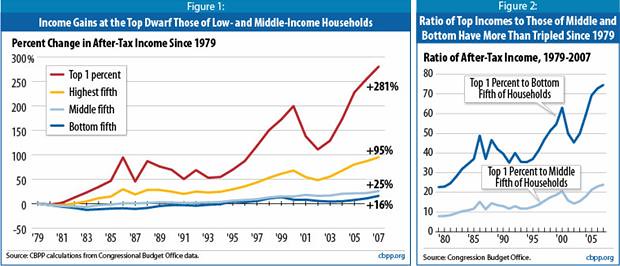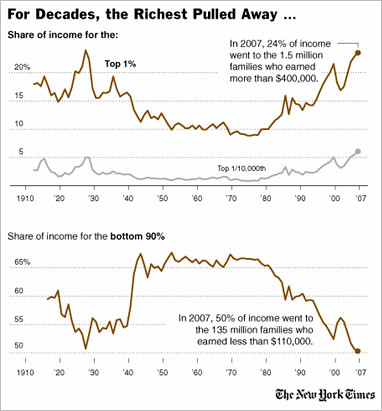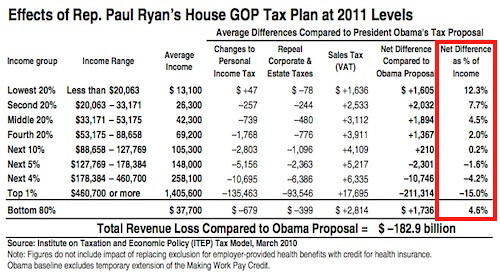Among the truisms of American politics is this: the side decrying "class war" is the one winning it. So it is with the ongoing Republican hostage-taking drama over the debt ceiling and upper-income tax increases. Facing overwhelming pressure from his own party, Speaker John Boehner retreated from the "grand bargain" on deficit reduction he supported rather than raise a dime in new tax revenue. And at a time when the federal tax burden is at its lowest in 60 years, income inequality at its highest level in 80 years and after a decade of plummeting rates on America's wealthiest taxpayers, Republicans would sooner torpedo the American economy than ask what the "yachting class" can do for their country.
That was the immediate reaction from Republicans in both houses of Congress to a $4 trillion debt reduction package featuring $1 trillion in new revenue over the next decade. Senators Dan Coats (R-IN) and Kelly Ayotte (R-NH) quickly called it "class warfare." Utah's Orrin Hatch wasn't content to lament "the usual class warfare the Democrats always wage." The poor, Hatch insisted, "need to share some of the responsibility." As for a Senate resolution asking the same of millionaires, Alabama Republican Jeff Sessions said that was "rather pathetic."
Of course, what is really pathetic is the declining tax burden on the small slice of Americans now taking an ever-larger piece of the economic pie.
Back in May, John Boehner explained to CBS News who Republicans would be trying to protect during the debt ceiling negotiations with President Obama:
"The top one percent of wage earners in the United States...pay forty percent of the income taxes...The people he's talking about taxing are the very people that we expect to reinvest in our economy."
If so, those expectations were sadly unmet after the tax cuts of George W. Bush. After all, the last time the top tax rate was 39.6% during the Clinton administration, the United States enjoyed rising incomes, 23 million new jobs and budget surpluses. Under Bush? Not so much.
But while Boehner's job creators didn't create any jobs after the top rate was trimmed to 35% and capital gains and dividends taxes were slashed, they did enjoy an unprecedented windfall courtesy of the United States Treasury.
For Republicans, this predictable result of the Bush tax cuts was a feature, not a bug.
As the Center for American Progress noted in 2004, "for the majority of Americans, the tax cuts meant very little," adding, "By next year, for instance, 88% of all Americans will receive $100 or less from the Administration's latest tax cuts."
But that's just the beginning of the story. As the CAP also reported, the Bush tax cuts delivered a third of their total benefits to the wealthiest 1% of Americans. And to be sure, their payday was staggering. The Center on Budget and Policy Priorities showed that millionaires on average pocketed almost $129,000 from the Bush tax cuts of 2001 and 2003. As a result, millionaires saw their after-tax incomes rise by 6.2%, while the gain for those earning between $40,000 and $50,000 was paltry 2.2%.
And as the New York Times uncovered in 2006, the 2003 Bush dividend and capital gains tax cuts offered almost nothing to taxpayers earning below $100,000 a year. Instead, those windfalls reduced taxes "on incomes of more than $10 million by an average of about $500,000." As the Times explained in a shocking chart: "The top 2 percent of taxpayers, those making more than $200,000, received more than 70% of the increased tax savings from those cuts in investment income."
It's no wonder that between 2001 and 2007- a period during which poverty was rising and average household income had fallen - the 400 richest taxpayers saw their incomes double to an average of $345 million even as their effective tax rate was virtually halved.
As ThinkProgress demonstrated, historically lower tax rates for the richest Americans did not produce either more job creation or faster economic growth. (In fact, the Bush years produced what David Leonhardt of the New York Times rightly labeled as "The decade with the slowest average annual growth since World War II.") But what the conservative cornucopia for the gilded-class does reliably produce is unprecedented income inequality:
A report from the Center on Budget and Policy Priorities (CBPP) found a financial Grand Canyon separating the very rich from everyone else. Over the three decades ending in 2007, the top 1 percent's share of the nation's total after-tax household income more than doubled, from 7.5 percent to 17.1 percent. During that time, the share of the middle 60% of Americans dropped from 51.1 percent to 43.5 percent; the bottom four-fifths declined from 58 percent to 48 percent. As for the poor, they fell further and further behind, with the lowest quintile's income share sliding to just 4.9%. Expressed in dollar terms, the income gap is staggering:
Between 1979 and 2007, average after-tax incomes for the top 1 percent rose by 281 percent after adjusting for inflation -- an increase in income of $973,100 per household -- compared to increases of 25 percent ($11,200 per household) for the middle fifth of households and 16 percent ($2,400 per household) for the bottom fifth.
As the New York Times revealed in August 2009, by 2007 the top 1% - the 1.5 million families earning more than $400,000 - reaped 24% of the nation's income. The bottom 90% - the 136 million families below $110,000 - accounted for just 50%.
If you had any lingering doubts about Warren Buffett's admission that "it's my class, the rich class, that's making war, and we're winning," this pair of charts from the New York Times should put them to rest. As the upper-income tax burden fell, income inequality in the U.S. exploded.
The pathetic irony is that 98% of Republicans in Congress voted for the Ryan budget proposal which would make both income inequality and the national debt much worse. Analyses by the Center on Budget and Policy Priorities showed that the Bush tax cuts accounted for half of the deficits during his tenure, and if made permanent, over the next decade would cost the U.S. Treasury more than Iraq, Afghanistan, the recession, TARP and the stimulus - combined. The Ryan budget adds $6 trillion in new debt over the next 10 years (necessitating, of course, that Republicans raise the debt ceiling repeatedly), $4 trillion of which is dedicated to new tax cuts.
And as Matthew Yglesias explained, earlier analyses of similar proposals in Ryan's Roadmap reveal that working Americans would have to pick up the tab left unpaid by upper-income households as the top rate is dropped from 35% to 25%:
This is an important element of Ryan's original "roadmap" plan that's never gotten the attention it deserves. But according to a Center for Tax Justice analysis (PDF), even though Ryan features large aggregate tax cuts, ninety percent of Americans would actually pay higher taxes under his plan.
In other words, it wasn't just cuts in middle class benefits in order to cut taxes on the rich. It was cuts in middle class benefits and middle class tax hikes in order to cut taxes on the rich. It'll be interesting to see if the House Republicans formally introduce such a plan and if so how many people will vote for it.
We now know the answer: 235 House Republicans and 40 GOP Senators.
On tax day in 2009, former Bush press flunky Ari Fleischer fretted about proposals to raise upper-income tax rates. (The top 10% of taxpayers, Fleischer argued, are "supporting virtually everyone and everything" and "their burden keeps getting heavier." As he also put it, "It's also what's called redistribution of income, and it is getting out of hand.") But it was Michele Bachmann who in February 2009 coined the slogan for the Republican class warriors:
"We're running out of rich people in this country."
She need not have worried.
As the Los Angeles Times explained in "Millionaires Make a Comeback", by 2010 the wealthy had more than made up their losses from the Bush Recession. (The middle class has not been so lucky.) Executive pay rose by 23% last year. Since 2009, corporate profits "captured 88% of the growth in real national income while aggregate wages and salaries accounted for only slightly more than 1% of the growth in real national income." By last summer, the Wall Street Journal proudly proclaimed, "U.S. Economy Is Increasingly Tied to the Rich." As a recent Deloitte presentation for wealth managers forecast:
Our analysis indicates that aggregate wealth of millionaire households in the U.S. in 2020 will likely reach $87 trillion, from $39 trillion in 2011.
For their part, Democrats including Kent Conrad, the Congressional Progressive Caucus, Bernie Sanders and Al Franken have offered proposals for reducing the U.S. debt in part by raising future taxes on millionaires and billionaires.
Of course, if Republicans continue to have their way, that will never come to pass. Their class war is over.
And if you have to ask who won it, the answer is simple. Not you.
(This piece also appears at Perrspectives.)







